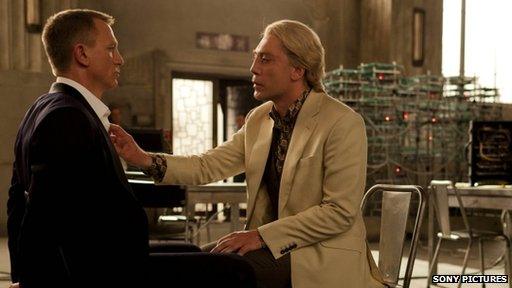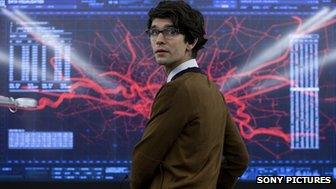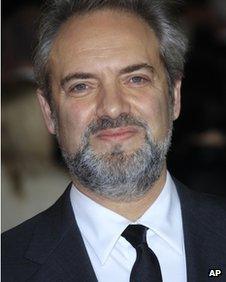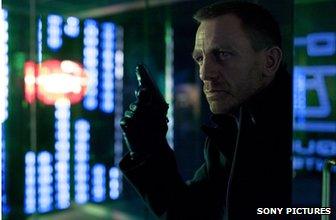Viewpoint: James Bond fails the tech test in Skyfall
- Published

In real life Bond's first conversation with Silva might have been hard to hear
As a self-confessed technology geek, there have been numerous occasions when my enjoyment of a movie has been marred by technological impossibilities. For example, Independence Day was ruined for me when Jeff Goldblum used an Apple Mac to transfer a virus to the alien mothership and thus saved mankind, all at a time when it was a miracle if you could get your Mac to talk to a printer via a cable.
So, for all you out there with similar sensitivities planning to go and see Skyfall, the latest in the Bond franchise, be warned! I have been to see this movie (expect spoilers below) and if you like your technology on the realistic side then you should see a different show...
One of the most glaring errors occurs in what is perhaps the most crucial scene between the cyber-terrorist bad guy Raoul Silva, played by Javier Bardem, and Bond, who is tied up throughout to a chair.
In the scene, the large room is dominated by the racks of computers that allow Silva to conduct his cyber-attacks.
What is striking to a geek like me however is the complete absence of background noise!
Firstly, a room full of computing hardware would have to be air-conditioned to keep the temperature of the servers down. Despite the precarious situation Bond was in, all I could think about was the potential of a fire caused by overheating throughout this scene.
Secondly, as anyone who has been in a server farm will tell you, you would have struggled to hear the conversation over the background humming from the machines themselves.
Hacked-off
Later we see an active hacking attempt on MI6 by Silva with Q and Bond watching an animation that represents the code involved in the attack.

Q's graphics looked better than a command-line interface
The animation is very creative but it has absolutely no resemblance to anything you might see in reality.
What you would actually see would be a plain command line - very dull admittedly. If you were very lucky you might have a mirror image of the attacker's screen but clever graphics? Not likely.
Again, we security geeks are asked to suspend our knowledge of the complexities of cryptography when we find Bond being able to decipher part of the code in order to spot Granborough Road Tube station embedded in the cipher.
If only it was as easy as that. Code-breaking is incredibly difficult, just ask the poor people at GCHQ who only last week had to admit they were stumped by a 70-year-old message taped to the leg of a dead pigeon, and can really only be done nowadays by large amounts of computing power.
I cannot remember the last time I broke even a simple substitution code, but admittedly I don't work for GCHQ.
Tracking shots
Then there is my particular bugbear - tracking Bond underground.

Director Sam Mendes did not make technological accuracy his top priority
The public have no idea how hard it is to even track people in indoor locations using radio frequency techniques such as wi-fi, Bluetooth or Zigbee.
It is highly unreliable. However difficult normal above-ground indoor tracking can be, tracking people underground is a nightmare.
Despite this, we see Q getting an immediate fix on Bond and easily tracking him as he navigates deep underneath London in the tunnels.
Arrhhhh, I'm an indoor location determination researcher... get me out of here!
Of course, it is not difficult to understand why films overreach in their depiction of technology.
Take just one example from Skyfall, such as hacking.
Hacking in the real world is quite mundane and involves a number of labour intensive steps from identifying the systems which have weaknesses to executing the "payloads" which allow capture of the remote systems.
It also quite often takes place on an old-fashioned "command line" with no fancy graphics at all. Any movie which attempted to give you a realistic interpretation of this would risk putting the audience to sleep.
Licence to school
The positive aspect for us involved in teaching computer science is that exciting overdramatisation of technology can encourage the younger generation to take up computing courses in higher education.
Even without the movie glamour however, life in computer sciences can be pretty exciting. One of the most involving aspects of my life is acting as an expert witness for defence lawyers in court cases.

It is lucky Bond did not have to pass an ICT exam to be able to return to active service
This often sees me forensically trawling through a defendant's hard disk or mobile phone in some corner of a police station, visiting suspects in prison and attending court in order to help with technical questions.
This is indeed a fast-paced world to be in, and one about to get even more interesting in the near future due to the sheer amount of information stored on digital devices.
The importance of this data and the need for secure systems is certainly one aspect of technology that Skyfall did get right - the James Bonds of the future will have to be very aware of the potential for disruption posed by hacking sensitive information and platforms.
Kevin Curran is a technical expert for internet and security matters at the Institute of Electrical and Electronics Engineers (IEEE), and is also a reader in computer science at the University of Ulster.
- Published27 November 2012
- Published29 October 2012
- Published26 October 2012